Leader of the Opposition (New Zealand)
In New Zealand, the leader of the Official Opposition, commonly described as the leader of the Opposition, is the politician who heads the Official Opposition. Conventionally, they are the leader of the largest political party in the House of Representatives that is not in Government (nor provides confidence and supply). This is usually the parliamentary leader of the second-largest caucus in the House of Representatives.[2]
| Leader of the Official Opposition of New Zealand | |
|---|---|
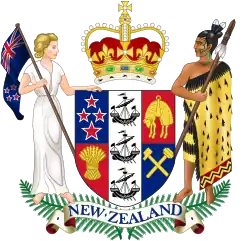 | |
| Official Opposition of New Zealand | |
| Reports to | Parliament |
| Term length | While leader of the largest political party in the House of Representatives that is not in government |
| Inaugural holder | John Ballance[a] |
| Formation | 2 July 1889[b] |
| Salary | $288,900 (As at 2016)[1] |
| ^ a. As the first parliamentary leader of an Opposition party. ^ b. The date Ballance was officially named Leader of the Opposition. | |
 |
|---|
|
|
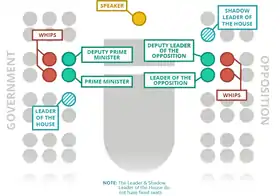
When in the debating chamber the leader of the Opposition sits on the left-hand side of the centre table, in front of the Opposition and directly opposite the prime minister.[3]
The role of the leader of the Opposition dates to the late 19th century, with the first political parties, and the office was formally recognised by law in 1933. Although currently mentioned in a number of statutes, the office is not formally established by any Act, just like the prime minister's role; it is simply a product of the conventions of the Westminster-style parliamentary system. The leader of the Opposition is paid a special salary by virtue of the office.
Typically the leader is elected by his or her party according to its rules. A new leader may be elected when the incumbent dies, resigns, or is challenged for the leadership. On 30 November 2021 Christopher Luxon was voted leader of the New Zealand National Party and thus leader of the Opposition [4]
Since 1936, the leader of the Opposition has invariably come from either the Labour or National parties.
Role
The term "opposition" has a specific meaning in the parliamentary sense; it is an important component of the Westminster system, with the Official Opposition having the task of directing criticism towards the Government. The leader of the Opposition chairs a Shadow Cabinet, which scrutinises the policies and actions of the Cabinet led by the prime minister, and promotes alternative policies.[5][6] Directed by the leader, the Opposition may move no-confidence motions to test the Government's majority or the confidence of the House.[7] The leader of the Opposition may be asked by the governor-general to form a new government if the incumbent government is unable to continue in office (e.g. upon a successful no-confidence motion).[8]
Apart from parliamentary duties, there are several ways in which the leader of the Opposition participates directly in affairs of state. Often, these relate to national security matters, which are supposed to transcend party politics – the New Zealand Security Intelligence Service, for example, is required to brief the leader of the Opposition as well as the prime minister on certain matters of national security.[9]
Salary
The leader of the Opposition receives a higher salary than other members of the Opposition, being paid the same amount as a Cabinet minister.[10] As at 2016 the Leader of the Opposition's salary is NZ$288,900.[11][1] In addition, like all other members of parliament, the leader of the Opposition receives annual allowances for travel and lodging.
History
For much of the country's early history, the role was not a formal one. For most of the 19th century, there was rarely any one person who could be identified as the leader of the Opposition. Prominent members were sometimes informally dubbed as "Leader of the Opposition" – often facetiously by rival politicians.[8] It was only when the Liberal Party was formed that any unified leadership appeared in Parliament, and the role of Opposition leader is generally traced from this point. John Ballance, leader of the Liberals (and later premier) is usually considered the first leader of the Opposition in the modern sense.[8]
When Ballance led the Liberals into government in 1891, they faced no formal opposition in a party sense, though certain MPs were styled leader of the Opposition. Their opponents gradually coalesced around a leader, William Massey, who became leader of the Opposition in 1903, and in 1909 became the first parliamentary leader of the new Reform Party.[12] For the first time, an Opposition party came forward as an alternative government.[12] After this, the leader of the Opposition was typically the parliamentary leader of the largest party in the House of Representatives that had not undertaken to support the government of the day.
One exception to this was during World War I, when the opposition Liberal Party accepted the governing Reform Party's offer to form a wartime coalition. Prime Minister Massey also extended the offer to the new Labour Party who rejected it. This made Labour the largest party not in government, however their leader Alfred Hindmarsh was not officially recognised as the leader of the Opposition. Joseph Ward, who became deputy prime minister in the wartime cabinet, still retained the title, albeit in name only.[13]
During the 1910s and 1920s, the role of Official Opposition alternated between the Liberal and Reform parties. However, the rise of the Labour Party in the 1920s, together with a gradual weakening in support for the Liberals, led to a three-party situation by the mid-1920s, with the Labour and Liberal parties having a similar number of seats. After the 1925 election there was no official leader of the Opposition until Rex Mason of Labour won the seat of Eden in the by-election held on 15 April 1926. Labour superseded the Liberals as the Official Opposition, and their leader Harry Holland became the leader of the Opposition.[14]
The 1928 general election put the United Party (a remnant of the Liberals) in government for the last time. Reform then became the Opposition, however in 1931 Reform entered into coalition with the Liberals, and Labour then became the Official Opposition, despite being the third party. The unity of the coalition, culminating in the formation of the National Party in 1936, created a stable two-party system, with National and Labour alternating between Government and Opposition for much of the remainder of the century.
Modern office
The office was first officially recognised by an Act of Parliament in 1933, when a special allowance was conferred on the holder.[8]
With the introduction of the mixed-member proportional (MMP) voting system, first used in the 1996 general election, the nature of parliamentary opposition has changed. Now, though the leader of the largest non-Government party still becomes the leader of the Opposition, there will usually be several parties who are "in opposition". An example of this arose after the 2002 general election, when the National Party gained only 27 seats – less than half the 58 seats held by opposition parties. This prompted calls from a number of parties, notably New Zealand First and the Greens, for the abolition or reform of the post. It was argued by these parties that the position had become an "anachronism" in the modern multi-party environment, and that the days of a united opposition bloc were gone. However, with the revival of the National Party in the 2005 general election, a more traditional relationship between Government and Opposition has been restored. According to Parliamentary Services, the leader of the Opposition formally represents and speaks for all parties that are outside Government.[15]
List of leaders of the Opposition
A table of leaders is below. Those who also served as prime minister, either before or after being leader of the Opposition, are indicated.
- Key
Liberal Conservative Reform Labour United National
| No. | Leader (Birth–Death) Constituency |
Portrait | Term of office | Party | Prime Minister | |||
|---|---|---|---|---|---|---|---|---|
| 1 | John Ballance (1839–1893) MP for Wanganui |
 |
2 July 1889 | 23 January 1891 | Liberal | Atkinson 1887–91 | ||
| 2 | John Bryce (1833–1913) MP for Waikato |
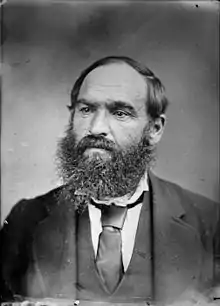 |
23 January 1891 | 31 August 1891 | Conservative | Ballance 1891–93 | ||
| 3 | William Rolleston (1831–1903) MP for Halswell |
.jpg.webp) |
31 August 1891 | 8 November 1893 | Conservative | |||
| Seddon 1893–1906 | ||||||||
| 4 | William Russell (1838–1913) MP for Hawkes Bay |
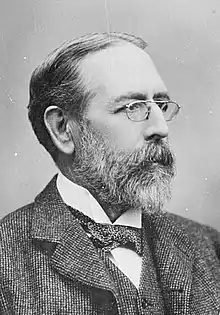 |
26 June 1894 | 3 July 1901 | Conservative | |||
| 5 | William Massey (1856–1925) MP for Franklin |
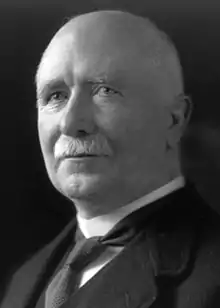 |
11 September 1903 | February 1909 | Conservative | |||
| Hall-Jones 1906 | ||||||||
| Ward 1906–12 | ||||||||
| February 1909 | 10 July 1912 | Reform | ||||||
| Mackenzie 1912 | ||||||||
| 6 | Joseph Ward (1856–1930) MP for Awarua[lower-alpha 1] |
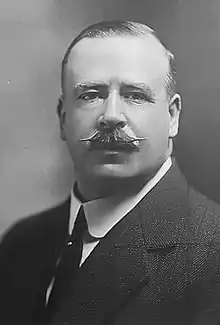 |
11 September 1913 | 27 November 1919 | Liberal | Massey 1912–25 | ||
| 7 | William MacDonald (1862–1920) MP for Bay of Plenty |
 |
21 January 1920 | 31 August 1920† | Liberal | |||
| 8 | Thomas Wilford (1870–1939) MP for Hutt |
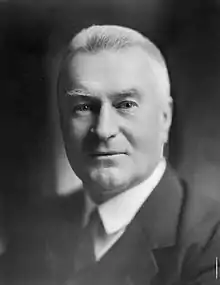 |
8 September 1920 | 13 August 1925 | Liberal | |||
| Bell 1925 | ||||||||
| Coates 1925–28 | ||||||||
| 9 | George Forbes (1869–1947) MP for Hurunui |
 |
13 August 1925 | 4 November 1925 | Liberal | |||
| Position vacant from 1925 general election until after 1926 Eden by-election |
4 November 1925 | 16 June 1926 | — | |||||
| 10 | Harry Holland (1868–1933) MP for Buller |
.jpg.webp) |
16 June 1926 | 18 October 1928 | Labour | |||
| (6) | Joseph Ward (1856–1930) MP for Invercargill |
 |
4 December 1928 | 10 December 1928 | United | |||
| 11 | Gordon Coates (1878–1943) MP for Kaipara |
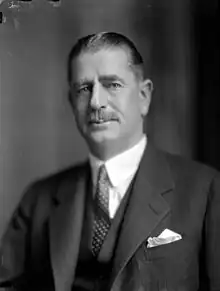 |
10 December 1928 | 22 September 1931 | Reform | Ward 1928–30 | ||
| Forbes 1930–35 | ||||||||
| (10) | Harry Holland (1868–1933) MP for Buller |
.jpg.webp) |
22 September 1931 | 8 October 1933† | Labour | |||
| 12 | Michael Joseph Savage (1872–1940) MP for Auckland West |
.jpg.webp) |
12 October 1933 | 6 December 1935 | Labour | |||
| (9) | George Forbes (1869–1947) MP for Hurunui |
 |
6 December 1935 | 14 May 1936 | United | Savage 1935–40 | ||
| 14 May 1936 | 2 November 1936 | National | ||||||
| 13 | Adam Hamilton (1880–1952) MP for Wallace |
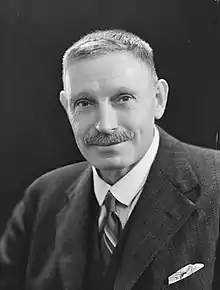 |
2 November 1936 | 26 November 1940 | National | |||
| Fraser 1940–49 | ||||||||
| 14 | Sidney Holland (1893–1961) MP for Christchurch North until 1946 MP for Fendalton from 1946 |
_2.png.webp) |
26 November 1940 | 13 December 1949 | National | |||
| 15 | Peter Fraser (1884–1950) MP for Brooklyn |
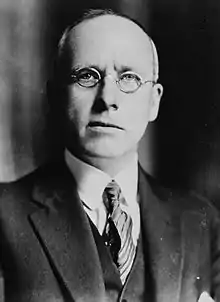 |
13 December 1949 | 12 December 1950† | Labour | Holland 1949–57 | ||
| 16 | Walter Nash (1882–1968) MP for Hutt |
.jpg.webp) |
17 January 1951 | 12 December 1957 | Labour | |||
| Holyoake 1957 | ||||||||
| 17 | Keith Holyoake (1904–1983) MP for Pahiatua |
.jpg.webp) |
12 December 1957 | 12 December 1960 | National | Nash 1957–60 | ||
| (16) | Walter Nash (1882–1968) MP for Hutt |
.jpg.webp) |
12 December 1960 | 31 March 1963 | Labour | Holyoake 1960–72 | ||
| 18 | Arnold Nordmeyer (1901–1989) MP for Island Bay |
.jpg.webp) |
1 April 1963 | 16 December 1965 | Labour | |||
| 19 | Norman Kirk (1923–1974) MP for Lyttelton until 1969 MP for Sydenham from 1969 |
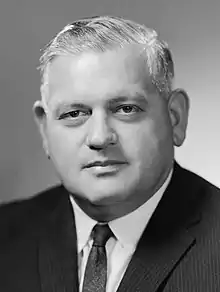 |
16 December 1965 | 8 December 1972 | Labour | |||
| Marshall 1972 | ||||||||
| 20 | Jack Marshall (1912–1988) MP for Karori |
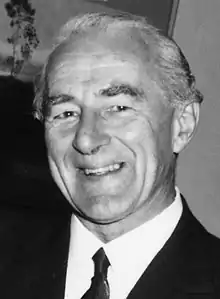 |
8 December 1972 | 9 July 1974 | National | Kirk 1972–74 | ||
| 21 | Robert Muldoon (1921–1992) MP for Tāmaki |
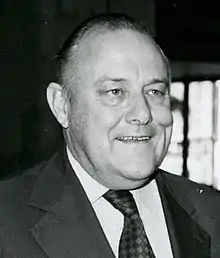 |
9 July 1974 | 12 December 1975 | National | |||
| Rowling 1974–75 | ||||||||
| 22 | Bill Rowling (1927–1995) MP for Tasman |
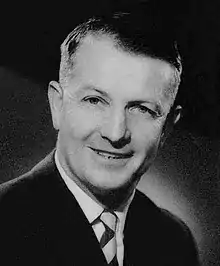 |
12 December 1975 | 3 February 1983 | Labour | Muldoon 1975–84 | ||
| 23 | David Lange (1942–2005) MP for Māngere |
.jpg.webp) |
3 February 1983 | 26 July 1984 | Labour | |||
| (21) | Robert Muldoon (1921–1992) MP for Tāmaki |
 |
26 July 1984 | 29 November 1984 | National | Lange 1984–89 | ||
| 24 | Jim McLay (born 1945) MP for Birkenhead |
.jpg.webp) |
29 November 1984 | 26 March 1986 | National | |||
| 25 | Jim Bolger (born 1935) MP for King Country |
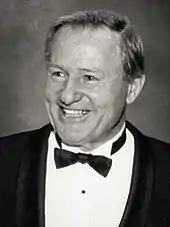 |
26 March 1986 | 2 November 1990 | National | |||
| Palmer 1989–90 | ||||||||
| Moore 1990 | ||||||||
| 26 | Mike Moore (1949–2020) MP for Christchurch North |
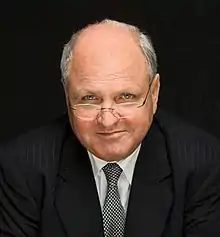 |
2 November 1990 | 1 December 1993 | Labour | Bolger 1990–97 | ||
| 27 | Helen Clark (born 1950) MP for Mount Albert |
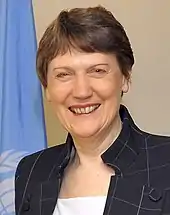 |
1 December 1993 | 10 December 1999 | Labour | |||
| Shipley 1997–99 | ||||||||
| 28 | Jenny Shipley (born 1952) MP for Rakaia |
.jpg.webp) |
10 December 1999 | 8 October 2001 | National | Clark 1999–2008 | ||
| 29 | Bill English (born 1961) MP for Clutha-Southland |
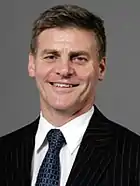 |
8 October 2001 | 28 October 2003 | National | |||
| 30 | Don Brash (born 1940) List MP |
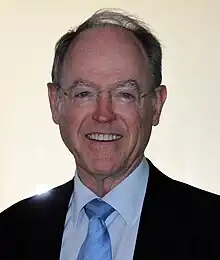 |
28 October 2003 | 27 November 2006 | National | |||
| 31 | John Key (born 1961) MP for Helensville |
 |
27 November 2006 | 19 November 2008 | National | |||
| 32 | Phil Goff (born 1953) MP for Mount Roskill |
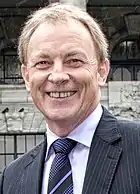 |
19 November 2008 | 13 December 2011 | Labour | Key 2008–16 | ||
| 33 | David Shearer (born 1957) MP for Mount Albert |
 |
13 December 2011 | 15 September 2013 | Labour | |||
| 34 | David Cunliffe (born 1963) MP for New Lynn |
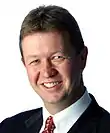 |
15 September 2013 | 27 September 2014 | Labour | |||
| 35 | Andrew Little (born 1965) List MP |
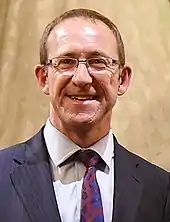 |
18 November 2014 | 1 August 2017 | Labour | |||
| English 2016–17 | ||||||||
| 36 | Jacinda Ardern (born 1980) MP for Mount Albert |
 |
1 August 2017 | 26 October 2017 | Labour | |||
| (29) | Bill English (born 1961) List MP |
.jpg.webp) |
26 October 2017 | 27 February 2018 | National | Ardern 2017–23 | ||
| 37 | Simon Bridges (born 1976) MP for Tauranga |
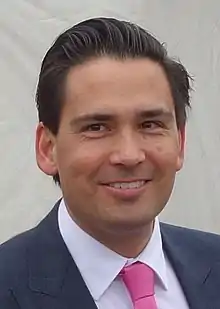 |
27 February 2018 | 22 May 2020 | National | |||
| 38 | Todd Muller (born 1968) MP for Bay of Plenty |
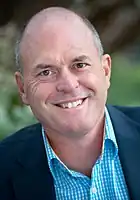 |
22 May 2020 | 14 July 2020 | National | |||
| 39 | Judith Collins (born 1959) MP for Papakura |
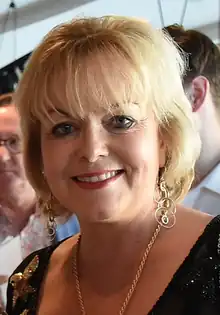 |
14 July 2020 | 25 November 2021 | National | |||
| — | Shane Reti[lower-alpha 2] (born 1963) List MP Interim Leader of the National Party |
.jpg.webp) |
25 November 2021 | 30 November 2021 | National | |||
| 40 | Christopher Luxon (born 1970) MP for Botany |
.jpg.webp) |
30 November 2021 | Incumbent | National | |||
| Hipkins 2023–present | ||||||||
- Notes
- From 4 August 1915 to 21 August 1919, the Reform Party and the Liberal Party formed a joint wartime coalition. Joseph Ward of the Liberals officially remained "Leader of the Opposition", even though he was actually part of the government.
- Shane Reti assumed the position of interim leader of the National Party due to the motion of no confidence against former leader Judith Collins.
References
- "MPs given 2.5 percent pay rise". Radio NZ. 8 November 2016. Retrieved 8 November 2016.
- "Glossary". New Zealand Parliament. Retrieved 12 October 2018.
- "People in Parliament". New Zealand Parliament. Retrieved 21 January 2009.
- "National leadership updates: 'We are the reset,' says Chris Luxon after becoming new leader". 30 November 2021.
- "The Relationship between the Government and the Opposition or Minority Parties in Selected Places" (PDF). 13 November 2002. Retrieved 28 May 2018.
- Martin, John E. (20 June 2012). "Parliament – The business of government". Te Ara: The Encyclopedia of New Zealand. § The opposition. Retrieved 30 May 2022.
- "The Opposition". nzhistory.govt.nz. Ministry for Culture and Heritage. 15 July 2014. Retrieved 30 May 2022.
- "Chapter 8 Parties and Government". www.parliament.nz. New Zealand Parliament. Retrieved 18 April 2020.
- "Overview". NZSIS. Archived from the original on 4 January 2009. Retrieved 21 January 2009.
- "Bill English admits pay rise 'a bit embarrassing'". New Zealand Herald. 21 November 2008. Retrieved 21 January 2009.
- "Parliamentary Salaries and Allowances Determination 2016" (PDF). New Zealand Parliament. 2016. Retrieved 28 May 2018.
- Gardner, William James (1966). McLintock, Alexander Hare (ed.). "MASSEY, William Ferguson". An Encyclopaedia of New Zealand. Retrieved 18 April 2020.
- Ward, Joseph George
- O'Farrell, Patrick. "Holland, Henry Edmund - Biography". Dictionary of New Zealand Biography. Ministry for Culture and Heritage. Retrieved 2 February 2016.
- "Who's who in Parliament?". Retrieved 9 February 2018.
External links
- People of Parliament – New Zealand Parliament
_(cropped).jpg.webp)
